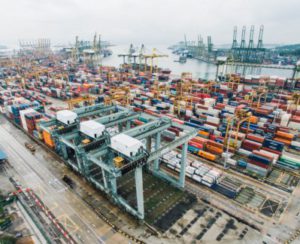A Brief Primer on the GATT

Rules on goods trade are found in the General Agreement on Tariff and Trade (GATT), various specific agreements addressing various aspects of the GATT (including the agreement on textiles and clothing, terminated in 2005), and a number of other decisions and understandings. Annexed to the GATT is the Uruguay Round Protocol which contains the results of negotiations on market access agreed by members as a result of the round.
GATT article 1 stipulates that obligation for all Members to accord Most-favoured Nation (MFN) treatment to all other members. GATT Article 3 stipulates the obligation to accord national treatment: that is, once a good has entered the customs territory of a member, it cannot be treated less favourably than “like” domestic products, for example, through discriminatory indirect taxes or discriminatory regulation. Unlike services (where members may schedule limitations on national treatment they wish to maintain) the scope of the prohibition under Article 3 is broad. Hence a significant proportion of WTO disputes deal with claims of discrimination, either de jure or de facto.
The GATT includes a general prohibition on the use of quantitative measures, such as quotas, on the grounds that these are more trade distorting than tariffs. The GATT also contains disciplines, notably, on the use of trade remedies (such as anti-dumping and countervailing duties), customs procedures and subsidies, all of which were the subject of specific agreements in addition to the disciplines of the GATT proper.
The GATT also allows a number of exceptions to its core principles. One set of exceptions is found under Article XX of the GATT, which allows for exemptions to the principles of non-discrimination (MFN and national treatment) for specified public policy purposes, including the protection of public morals, the protection of human, animal or plant life or health, and the conservation of exhaustible natural resources. The requirement is that measures taken for these purposes do not constitute arbitrary or unjustifiable discrimination between countries or a disguised restriction on trade. The agreements on Technical Barriers to Trade and on Sanitary and Phyto-Sanitary measures contain further disciplines on regulatory measures taken for such public policy purposes.
Case law under Article XX, and the TBT and SPS agreements, has focused on the question of whether measures are indeed necessary to achieve the stated objectives and whether the prohibitions on arbitrary/ unjustifiable discrimination or disguised restraints of trade have been met. One of the likely implications for the UK, post-Brexit, is that it will need to develop its internal capacity to defend its regulatory positions, and challenge those of others, on these grounds. Promoting principles of good regulatory practice would be a useful starting point.
Another important exemption is the permission, under GATT article XXIV, for members to enter into preferential regional trade agreements, on condition that these arrangements liberalise “substantially all” trade and do not raise barriers to other members. The provisions of GATT article XXIV – notably what constitutes “substantially all” trade – have never been tested through dispute settlement. But one of the implications for the UK is that any agreement it seeks to strike (whether with the EU or others) needs to be comprehensive in scope: sector deals are out.
The GATT also allows various deviations from its principles for developing countries. A specific decision (formally separate to the GATT and known commonly as the Enabling Clause) allows developed members to accord preferential levels of market access to developing countries, and enhanced preferences to the poorest of these (the least-developed countries). The requirement is that the beneficiaries be determined on objective grounds and that these schemes do not involve arbitrary discrimination between members at the same level of development.